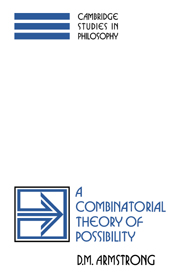Book contents
- Frontmatter
- Contents
- Preface
- PART I NON-NATURALIST THEORIES OF POSSIBILITY
- PART II A COMBINATORIAL AND NATURALIST ACCOUNT OF POSSIBILITY
- 3 Possibility in a simple world
- 4 Expanding and contracting the world
- 5 Relative atoms
- 6 Are there de re incompatibilities and necessities?
- 7 Higher-order entities, negation and causation
- 8 Supervenience
- 9 Mathematics
- 10 Final questions: logic
- Works cited
- Appendix: Tractarian Nominalism, by Brian Skyrms
- Index
4 - Expanding and contracting the world
Published online by Cambridge University Press: 05 June 2012
- Frontmatter
- Contents
- Preface
- PART I NON-NATURALIST THEORIES OF POSSIBILITY
- PART II A COMBINATORIAL AND NATURALIST ACCOUNT OF POSSIBILITY
- 3 Possibility in a simple world
- 4 Expanding and contracting the world
- 5 Relative atoms
- 6 Are there de re incompatibilities and necessities?
- 7 Higher-order entities, negation and causation
- 8 Supervenience
- 9 Mathematics
- 10 Final questions: logic
- Works cited
- Appendix: Tractarian Nominalism, by Brian Skyrms
- Index
Summary
MORE UNIVERSALS?
Suppose one is a Naturalist, holding that the space-time world is all there is. Suppose further that one holds that this space-time world has an ultimate structure: It is a conjunction of states of affairs whose constituents are individuals having (universal) properties and relations, the identification of these universals being an a posteriori matter. Suppose, finally, that one holds a Combinatorial theory of possibility, holding, in particular, that all mere possibilities are (non-existent) recombinations of actual elements.
Two difficulties present themselves: First, is it not possible that there should be universals which neither are identical with actual (that is, instantiated) universals nor have as constituents actual universals? Following Lewis (1986a, pp. 91–2), call such universals alien universals. Second, is it not possible that there should be individuals which are neither identical with actual individuals nor put together out of actual individuals? Call such individuals alien individuals. Alien universals and alien individuals seem to be ruled out by our three premisses.
The present section will consider the question of alien universals. I will deny their possibility. The position concerning alien individuals is more complex. I am reluctant to deny their possibility. As a result, a modification of the Combinatorial scheme is forced on me. That will be a matter for a succeeding section; in the meanwhile we address the problem of alien universals.
- Type
- Chapter
- Information
- A Combinatorial Theory of Possibility , pp. 54 - 65Publisher: Cambridge University PressPrint publication year: 1989



